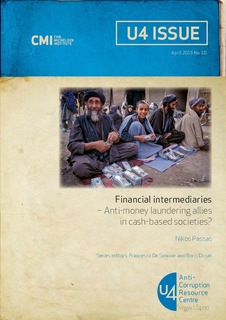| dc.contributor.author | Passas, Nikos | |
| dc.date.accessioned | 2018-01-04T08:23:33Z | |
| dc.date.available | 2018-01-04T08:23:33Z | |
| dc.date.issued | 2015-01-01 | |
| dc.identifier | oai:www.cmi.no:5540 | |
| dc.identifier.citation | Chr. Michelsen Institute (U4 Issue 2015:10) 30 p. | |
| dc.identifier.uri | http://hdl.handle.net/11250/2475426 | |
| dc.description.abstract | Many informal cash-based economies run parallel financial systems that are very different to the Western banking concept. Such countries are perceived to have a high risk of money laundering. Looking at Afghanistan, Somalia, and India – where anti-money laundering efforts have yielded mixed results – this paper draws lessons from the operations of financial intermediaries. These countries are considered high risk not only for money laundering and terrorism financing, but also for corruption and political and legal concerns. The issues at hand – risk assessments for remittances, strategies of engaging on the ground, resource management, and alternatives to the existing financial networks – are also valid for other cash-based, low-income societies. In fact, informal remittance channels may provide opportunities to strengthen regulatory and governance capacities. | |
| dc.language.iso | eng | |
| dc.publisher | Chr. Michelsen Institute | |
| dc.relation | U4 Issue | |
| dc.relation | 2015:10 | |
| dc.relation.ispartof | U4 Issue | |
| dc.relation.ispartofseries | U4 Issue 2015:10 | |
| dc.relation.uri | https://www.cmi.no/publications/5540-financial-intermediaries | |
| dc.subject | International Drivers of Corruption | |
| dc.subject | Afghanistan | |
| dc.subject | Anti-Money Laundering | |
| dc.subject | Cash-Based Societies | |
| dc.subject | Financial Intermediaries | |
| dc.subject | Hawalas | |
| dc.subject | India | |
| dc.subject | Remittances | |
| dc.subject | Somalia | |
| dc.subject | Terrorism Financing | |
| dc.title | Financial intermediaries – Anti-money laundering allies in cash-based societies? | |
| dc.type | Research report | |
